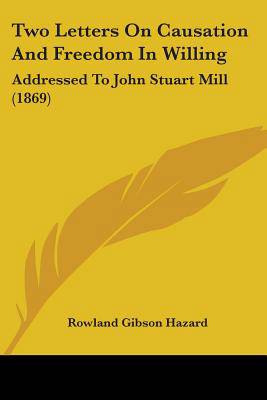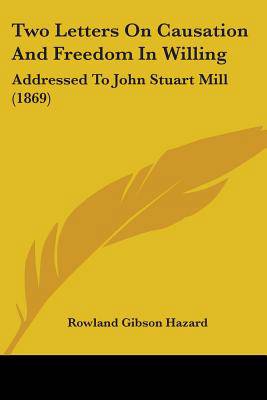
- Afhalen na 1 uur in een winkel met voorraad
- Gratis thuislevering in België vanaf € 30
- Ruim aanbod met 7 miljoen producten
- Afhalen na 1 uur in een winkel met voorraad
- Gratis thuislevering in België vanaf € 30
- Ruim aanbod met 7 miljoen producten
Zoeken
Two Letters On Causation And Freedom In Willing
Addressed To John Stuart Mill (1869)
Rowland Gibson Hazard
Paperback | Engels
€ 43,45
+ 86 punten
Uitvoering
Omschrijving
""Two Letters on Causation and Freedom in Willing: Addressed to John Stuart Mill"" is a philosophical work written by Rowland Gibson Hazard in 1869. The book consists of two letters that were written in response to John Stuart Mill's essay on causation and freedom. Hazard argues that Mill's theory of causation is incomplete and that it fails to account for the role of the will in human action. He also contends that Mill's view of freedom is too narrow and that it does not allow for genuine moral responsibility. In his letters, Hazard explores the relationship between causation and freedom and offers his own theory of the will as a cause of action. He also discusses the implications of his theory for moral philosophy and argues that it provides a more robust account of human agency and responsibility. Overall, ""Two Letters on Causation and Freedom in Willing"" is a thoughtful and insightful work of philosophy that engages with some of the most fundamental questions about human action and moral responsibility.With An Appendix, On The Existence Of Matter, And Our Notions Of Infinite Space.This scarce antiquarian book is a facsimile reprint of the old original and may contain some imperfections such as library marks and notations. Because we believe this work is culturally important, we have made it available as part of our commitment for protecting, preserving, and promoting the world's literature in affordable, high quality, modern editions, that are true to their original work.
Specificaties
Betrokkenen
- Auteur(s):
- Uitgeverij:
Inhoud
- Aantal bladzijden:
- 304
- Taal:
- Engels
Eigenschappen
- Productcode (EAN):
- 9781104516529
- Verschijningsdatum:
- 10/05/2009
- Uitvoering:
- Paperback
- Formaat:
- Trade paperback (VS)
- Afmetingen:
- 152 mm x 229 mm
- Gewicht:
- 408 g

Alleen bij Standaard Boekhandel
+ 86 punten op je klantenkaart van Standaard Boekhandel
Beoordelingen
We publiceren alleen reviews die voldoen aan de voorwaarden voor reviews. Bekijk onze voorwaarden voor reviews.











